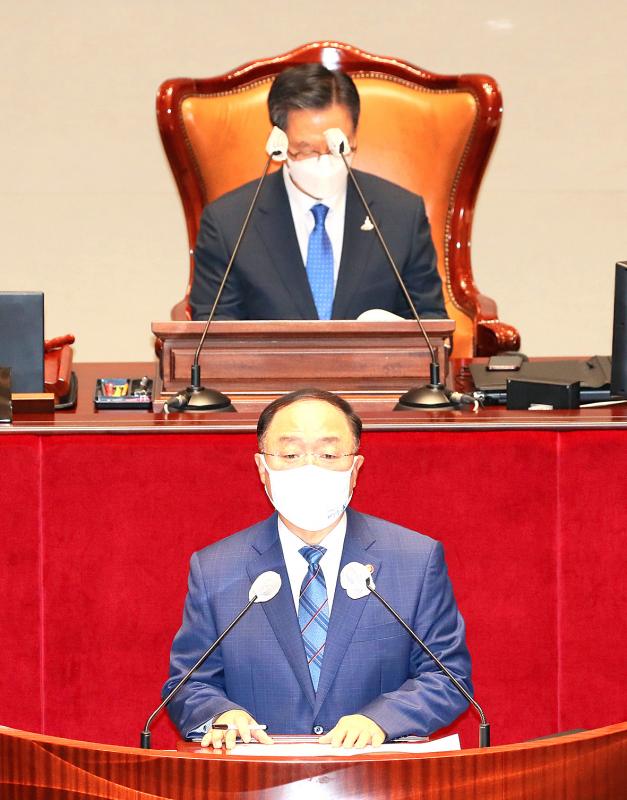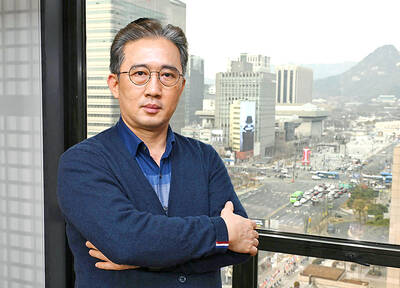South Korean Minister of Finance Hong Nam-ki, the architect of rules aimed at protecting tenants and slowing deposit increases, has himself been forced to look for a new home as landlords react to the rules by quickly replacing tenants so they can bump up deposits.
Hong is also faced with broadening his search, as the average deposit where he lives 20 minutes from parliament has soared by one-third since his housing rules took effect in July, with the irony of his predicament setting the Internet alight.
“Worse comes to worst, he can camp by the Presidential Blue House, right?” one user wrote on a real-estate forum.

Photo: EPA-EFE
Seoul apartment prices have risen more than 50 percent since South Korean President Moon Jae-in inherited loosened mortgage rules from the previous administration three years ago.
To slow buy-to-rent demand, the Housing Lease Protection Act, led by Hong, capped increases of jeonse deposits at 5 percent and allowed tenants to extend standard two-year contracts for another two, unless landlords themselves move into the property.
Jeonse is a lump-sum returnable deposit paid instead of monthly rent.
The act led to an unprecedented shortage of jeonse housing nationwide as landlords sought to empty properties ahead of July so they could increase deposits for new tenants, expecting not to be able to raise them again for four years.
In Hong’s case, his lease ends in January, at which time his landlord is set to move into the property, said a realtor citing an industry database, echoing local media reports.
“My fellow landlords, let’s not rent out to Hong, let him suffer!” wrote a landlord on the popular real-estate forum. “Let’s make him feel what the government has done!”
For a comparable apartment with three bedrooms in Hong’s complex in Seoul’s up-market Mapo area, he faces deposits that have surged 32 percent in three months to 830 million won (US$731,310), Naver Real Estate data showed.
Hong, who has served the government for more than 30 years, had a net worth of 1.06 billion won at the end of December last year, government data showed.
Hong is one of a group of senior officials popularly blamed for failing to curb runaway home prices in Asia’s fourth-largest economy, even after more than 20 rounds of mortgage curbs and other steps during Moon’s tenure.
In that time, median Seoul apartment prices have risen more than 50 percent, KB Bank data showed.
His forced move opened a geyser of schadenfreude, with South Koreans struggling to find affordable housing mocking Hong for being a victim of his own making.
“Dear Hong, come and live in my place. I’ll give you a good deal,” one netizen said.
“Hong’s so smart. Way to go bro. Keep playing the victim and demand a bigger job from Moon,” another wrote.

VAGUE: The criteria of the amnesty remain unclear, but it would cover political violence from 1999 to today, and those convicted of murder or drug trafficking would not qualify Venezuelan Acting President Delcy Rodriguez on Friday announced an amnesty bill that could lead to the release of hundreds of prisoners, including opposition leaders, journalists and human rights activists detained for political reasons. The measure had long been sought by the US-backed opposition. It is the latest concession Rodriguez has made since taking the reins of the country on Jan. 3 after the brazen seizure of then-Venezuelan president Nicolas Maduro. Rodriguez told a gathering of justices, magistrates, ministers, military brass and other government leaders that the ruling party-controlled Venezuelan National Assembly would take up the bill with urgency. Rodriguez also announced the shutdown

Chinese President Xi Jinping’s (習近平) purge of his most senior general is driven by his effort to both secure “total control” of his military and root out corruption, US Ambassador to China David Perdue said told Bloomberg Television yesterday. The probe into Zhang Youxia (張又俠), Xi’s second-in-command, announced over the weekend, is a “major development,” Perdue said, citing the family connections the vice chair of China’s apex military commission has with Xi. Chinese authorities said Zhang was being investigated for suspected serious discipline and law violations, without disclosing further details. “I take him at his word that there’s a corruption effort under

China executed 11 people linked to Myanmar criminal gangs, including “key members” of telecom scam operations, state media reported yesterday, as Beijing toughens its response to the sprawling, transnational industry. Fraud compounds where scammers lure Internet users into fake romantic relationships and cryptocurrency investments have flourished across Southeast Asia, including in Myanmar. Initially largely targeting Chinese speakers, the criminal groups behind the compounds have expanded operations into multiple languages to steal from victims around the world. Those conducting the scams are sometimes willing con artists, and other times trafficked foreign nationals forced to work. In the past few years, Beijing has stepped up cooperation

The dramatic US operation that deposed Venezuelan president Nicolas Maduro this month might have left North Korean leader Kim Jong-un feeling he was also vulnerable to “decapitation,” a former Pyongyang envoy to Havana said. Lee Il-kyu — who served as Pyongyang’s political counselor in Cuba from 2019 until 2023 — said that Washington’s lightning extraction in Caracas was a worst-case scenario for his former boss. “Kim must have felt that a so-called decapitation operation is actually possible,” said Lee, who now works for a state-backed think tank in Seoul. North Korea’s leadership has long accused Washington of seeking to remove it from power